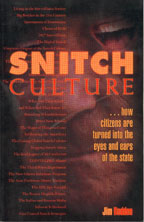 |
 Talking
about books Talking
about books
By Chuck Armsbury, Senior Editor
We've been reviewing some new books on the market that should
be in your personal or office library. These three recent publications
reviewed here should help any reader develop new insight into
the drug war. The experience and reflection of a thoughtful federal
judge, the mission of a small desktop publisher and the investigations
of an Oregon activist together form a complete package of knowledge
for anyone wanting to know why things are so wrong with our courts,
prisons and communities.
 Federal Judge
James P. Gray has written Why Our Drug Laws Have Failed and
What We Can Do About It - A Judicial Indictment on the War on
Drugs, a 320-page volume available in paperback from Temple
University Press, 1601 N. Broad Street, Philadelphia, PA 19122-6099.
For online ordering email: kramer@mail.temple.edu or phone Gary
Kramer at (215) 204-3440. The paperback edition sells for $19.95,
the hardback for $59.50. Federal Judge
James P. Gray has written Why Our Drug Laws Have Failed and
What We Can Do About It - A Judicial Indictment on the War on
Drugs, a 320-page volume available in paperback from Temple
University Press, 1601 N. Broad Street, Philadelphia, PA 19122-6099.
For online ordering email: kramer@mail.temple.edu or phone Gary
Kramer at (215) 204-3440. The paperback edition sells for $19.95,
the hardback for $59.50.
In his book Judge Gray calls for a complete discussion and change
of direction in our country's drug policies. A former federal
prosecutor and veteran Judge of the Superior Court in Orange
County, California, Gray was also a criminal defense attorney
in the Navy JAG Corps. He is one of few federal jurists who have
spoken out publicly against the drug war, and he has logged more
than 100 radio appearances, TV specials and drug forums nationwide.
Longtime drug war foe, Walter Cronkite, offered this brief review:
"Judge Gray's thorough and scholarly work, based as it is
on his personal experience, should help considerably to improve
our impossible drug laws. His book drives a stake through the
heart of the failed War on Drugs and gives us options to hope
for in the battles to come."
From the Publisher's Weekly -
"Gray effectively documents a growing coalition of often
conservative lawyers, legislators and justices who view the drug
war's impotent dream of national abstinence as folly and its
shadow effects (from imprisonment of non-violent offenders to
diversion of law enforcement resources) as dangers to liberty.
Gray writes with the courage of his convictions, bluntly addressing
the most controversial elements of the drug war. For example,
he asserts that politicians offer slavish loyalty to the drug
war because it's "fundable," not because it is winnable.
Similarly, Gray details how drug prosecutions have both whittled
away at constitutional protections and corrupted many police
agencies. He even takes the radical step of humanizing drug users.
Without assuming a libertarian stance, he establishes that the
risks to an individual who is determined to use drugs are dwarfed
by the harm caused to the community by overaggressive policing
and the criminal economy. Gray's crisp prose is mercifully short
on legalese, and his book has the structural clarity of an accessible
legal text. This quality, and the sensible passion of Gray's
conclusions, will make this a crucial reference for those politicians,
voters, activists and law enforcement agencies seeking to reform
established policy."
Prisoners can certainly learn and gain something by reading Judge
Gray's book, but in their situation more help is needed. After
conviction and exhaustion of direct appeals, most prisoners from
financial necessity must file their own post-conviction pleadings
in court. Prisoners, especially those with very long sentences,
must help themselves and work alone at this point, and now they
can get some useful, legal assistance.
 In true self-help
fashion, Maggie Medjuck, president of PSI Publishing Inc., says
that she and her husband were motivated to write The Prisoner's
Guide to Survival after a close family member lost his appeal
and is serving 24 years for a non-violent drug offense under
the mandatory minimum laws. "We have spent the last five
years preparing the Guide for publication after experiencing
years of frustration and disappointment in our dealings with
the justice system. Our main goal was to write a legal assistance
manual that was simple enough for the legal novice to understand,
and yet comprehensive enough to be practical and useful,"
said Medjuck in a letter to the Razor Wire. In true self-help
fashion, Maggie Medjuck, president of PSI Publishing Inc., says
that she and her husband were motivated to write The Prisoner's
Guide to Survival after a close family member lost his appeal
and is serving 24 years for a non-violent drug offense under
the mandatory minimum laws. "We have spent the last five
years preparing the Guide for publication after experiencing
years of frustration and disappointment in our dealings with
the justice system. Our main goal was to write a legal assistance
manual that was simple enough for the legal novice to understand,
and yet comprehensive enough to be practical and useful,"
said Medjuck in a letter to the Razor Wire.
This 745-page book can be purchased from PSI Publishing, Inc.,
413-B 19th Street, #168, Lynden, WA 98264 in paperback at $49.95
for prisoners - $64.95 for free world buyers - plus $5 shipping
and handling. Their toll-free telephone number is (800) 557-8868.
With each book mailed to a prisoner, PSI Publishing encloses
a cover letter inviting the reader to send any comments or opinions
about the book to them so future editions can be improved. Medjuck
says they have consistently received positive feedback about
the ease of using it.
Editor Paul Wright of Prison Legal News has endorsed this book
in glowing terms. "Washington state currently plans to eliminate
its prison law libraries, which means books like this one will
be increasingly important to prisoners' assertion of our legal
rights. I think it's a great book that will be extremely useful
to prisoners," said Wright in his reviewing comments.
 I started
Jim Redden's book, Snitch Culture: How Citizens are Turned
into the Eyes and Ears of the State, thinking I would learn
nothing new. That was wrong because this 235-page paperback is
loaded with the history and details of our society's rush to
tattle on each other. We know about snitches from the Bible,
how Judas Iscariot betrayed Jesus Christ. Telling on one's family
or friends has been with us a long time, Redden insists from
the opening chapter. I started
Jim Redden's book, Snitch Culture: How Citizens are Turned
into the Eyes and Ears of the State, thinking I would learn
nothing new. That was wrong because this 235-page paperback is
loaded with the history and details of our society's rush to
tattle on each other. We know about snitches from the Bible,
how Judas Iscariot betrayed Jesus Christ. Telling on one's family
or friends has been with us a long time, Redden insists from
the opening chapter.
On the book's back cover it says, "Welcome to Snitch Culture,
a surveillance society far more insidious and pervasive than
anything George Orwell ever imagined. Elected officials from
both political parties have spent decades building a vast domestic
intelligence network to track every man, woman and child."
This is a valuable piece of investigative reporting that when
you're done reading it, you will easily understand why you can't
trust anyone these days.
Children turn their parents into the police on two-bit drug charges.
Classmates tattle on one another to school officials. Friends
rat each other out to the authorities. Political advocacy groups
report suspected dissidents to the FBI. Employers hire undercover
agents to spy on workers. Lawyers are forced to report clients
who pay with cash to law enforcement agencies. Snitch Culture
covers all of these issues and much more.
I was particularly drawn to the reporting on the acclaimed Southern
Poverty Law Center and its director, Morris Dees. It seems that
Dees and his Center's proclaimed mission to watch and document
racist, white organizations, such as the Aryan Nations in Idaho,
also includes new work tracking the young anti-globalization
youth seen prominently in the streets of Seattle in November
1999.
Also, Redden's chapter on the bombing of the federal building
in Oklahoma City has convinced me that this act of terror was
a murky enterprise of government moles, assorted outlaws, gun
runners and other disenchanted men like Timothy McVeigh. The
details presented in this chapter give the reader credible evidence
for massive government conspiracies that are definitely critical
in creating our Snitch Culture.
I highly recommend this book because of its lengthy reporting
on drug war surveillance and its many snitches. One chapter discusses
whistleblowers as special snitches. At the end, the book leaves
you understanding its main premise: widespread, indiscriminate,
opportunistic, and professional snitching has broken the back
of many attempts at social movements and community solidarity.
There can be no trust in this persistent climate of betrayal.
You can order Snitch Culture from Feral House, 2554 Lincoln
Blvd., Suite 1059, Venice, CA 90291. It's in paperback and priced
at $14.95. Send check or money order, and add $3.50 for shipping
first book, $1.50 for each additional one. Feral House has a
website: www.FeralHouse.com

|

